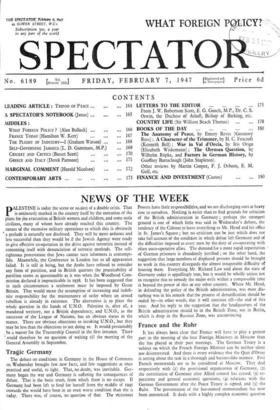Tragic Germany
The debate on conditions in Germany in the House bf Commons on Wednesday brought few new facts, and few suggestions at bnce practical and useful, to light. That, no doubt, was inevitable. Ger- many began the war and Germany is suffering the consequences of defeat. That is the basic truth, from which there is no escape. If Germany had been left to fend for herself from the middle of 1945 onwards she would have been in an even worse condition than she is today. There was, of course, no question of that. The victorious
Powers have their responsibilities, and we are discharging ours at heavy cost to ourselves. Nothing is easier than to find grounds for criticism of the British administration in Germany ; perhaps the strongest ground is one of which little was said in Wednesday's debate, the tendency of the Cabinet to leave everything to Mr. Hynd and his office in St. James's Square ; but no criticism can be just which does not take full account of the condition in which defeat left Germany and of the difficulties imposed at every turn by the duty of co-operating with often unco-operative allies. The demand for a more rapid repatriation of German prisoners is abundantly justified ; on the other hand, the suggestion that large numbers of displaced persons should be brought to work in this country disregards the almost insuperable difficulty of housing them. Everything Mr. Richard Law said about the state of Germany today is appallingly true, but it would be wholly unjust not to recognise that to remedy the major evils within a compassable time is beyond the power of this or any other country. Where Mr. Hynd, in defending the policy of the British administration, was most dis- turbing was in his remark that the process of denazification should be ended by—in other words, that it will continue till—the end of this year. And his reply to the suggestion that the headquarters of the British administration should be in the British Zone, not in Berlin, which is deep in the Russian Zone, was unconvincing.


































